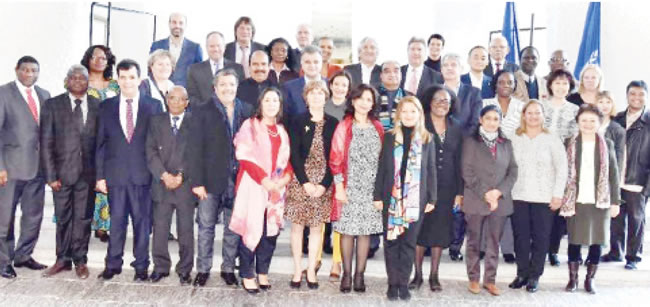The impact of COVID-19 on the world of work featured prominently in the June segment of the first virtual International Labour Conference. Conclusions on social protection and the application of international labour standards were adopted on the final day, along with an emergency resolution on Myanmar.
The 109th session of the International Labour Conference (ILC) has come to a close, the first virtual ILC in its history and one that featured intensive discussions on the impact of COVID-19 on the world of work and how to ensure a human-centred, inclusive recovery.
Conclusions on social protection and the application of international labour standards were adopted on the final day, along with an emergency resolution on Myanmar.
During plenary discussions, delegates addressed the Director-General’s report to the Conference on: Work in the time of COVID, which applied the human-centred approach of the ILO’s 2019 Centenary Declaration to achieving a sustainable and inclusive global pandemic response. Delegates unanimously adopted a Global Call to Action outlining measures to create a human-centred recovery from the pandemic to avoid long-term scarring of economies and societies.
A World of Work Summit was held on June 17 – 18 which featured addresses from world leaders and representatives of workers’ and employers’ organizations, and the United Nations. They included Pope Francis, President of the Republic of Korea, Moon Jae-in, Portuguese Prime Minister, António Costa, US President, Joe Biden and President of the Democratic Republic of Congo, Félix Tshisekedi. The summit focused on the need for a global response to the COVID-19 crisis and the action required to build a better future of work.
The Conference adopted the report of its Committee on the Application of Standards (CAS), which adopted conclusions on the application of specific ILO Conventions in 19 countries. It included Belarus, El Salvador and Zimbabwe in special paragraphs identifying particularly serious problems in the application of standards. It agreed on the importance of promoting employment and decent work in a rapidly changing world of work, stressing the need for governments, in consultation with employers’ and workers’ organizations and stakeholders to develop, implement, monitor and review policies and programmes rooted in International Labour Standards.
A discussion on social protection focused on the impact of COVID-19 and on the rapid changes occurring in the world of work. Delegates adopted conclusions that outlined a framework for urgent action towards universal, adequate, comprehensive and sustainable social protection systems that are adapted to developments in the world of work.
The actions included measures to strengthen national social protection policies, close financing gaps, strengthen governance and adapt social protection systems in the aftermath of the crisis and in the context of the future of work.
Delegates adopted an emergency resolution on Myanmar, which called for the restoration of democracy, the reestablishment of civilian rule, the end to arbitrary detentions and violations of human rights, and the restoration of fundamental principles and rights at work. It called on the ILO Governing Body to monitor the situation in Myanmar and follow up on the implementation of the resolution.
Delegates also voted to adopt the ILO Programme and Budget for the 2022-3 biennium. In addition, they agreed to abrogate or withdraw 29 outdated international labour instruments.
Closing the ILC, the ILO Director-General, Guy Ryder, expressed satisfaction at the results obtained during what he described as a ‘remarkable’ Conference, guaranteeing the institutional and business continuity of the Organization.
“What has been done over the last few weeks places our Organization where it needs to be. It equips our Organization to rise to the challenges of this most difficult moment in the world of work. It’s an expression of how many governments, workers and employers look to us for leadership and action,” he said.
Nearly 4,500 delegates took part in the virtual ILC, including 171 ministers, one of which is Nigeria Minister of Labour and Employment, Chris Ngige and vice-ministers and high-level representatives from workers and employers, from 181 ILO member states.
YOU SHOULD NOT MISS THESE HEADLINES FROM NIGERIAN TRIBUNE
We Have Not Had Water Supply In Months ― Abeokuta Residents
In spite of the huge investment in the water sector by the government and international organisations, water scarcity has grown to become a perennial nightmare for residents of Abeokuta, the Ogun State capital. This report x-rays the lives and experiences of residents in getting clean, potable and affordable water amidst the surge of COVID-19 cases in the state…
Selfies, video calls and Chinese documentaries: The things you’ll meet onboard Lagos-Ibadan train
The Lagos-Ibadan railway was inaugurated recently for a full paid operation by the Nigerian Railway Corporation after about a year of free test-run. Our reporter joined the train to and fro Lagos from Ibadan and tells his experience in this report…
[ICYMI] Lekki Shootings: Why We Lied About Our Presence — General Taiwo
The Lagos State Judicial Panel of Inquiry probing the killings at Lekki Toll Gate, on Saturday resumed viewing of the 24hrs footage of the October 20, 2020 shooting of #EndSARS protesters by personnel of the Nigerian Army…






